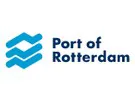 The Port of Rotterdam saw a freight throughput of 469.4 million tonnes in 2019, fractionally higher than in 2018 (469 million tonnes). Investments by the Port of Rotterdam Authority were again at a high level, with gross investments including participations amounting to €338.3 million (2018: €408.1 million). The net result excluding taxes amounted to €241 million (2018: €254.1 million).
The Port of Rotterdam saw a freight throughput of 469.4 million tonnes in 2019, fractionally higher than in 2018 (469 million tonnes). Investments by the Port of Rotterdam Authority were again at a high level, with gross investments including participations amounting to €338.3 million (2018: €408.1 million). The net result excluding taxes amounted to €241 million (2018: €254.1 million).
Significant underlying shifts were observable between the various commodities. Whereas crude oil, container, LNG and biomass throughputs increased, coal and mineral oil product throughputs decreased. Over the past year significant progress has been made with digitisation and the energy transition, in particular through the launch of PortXchange, the proposed expansion of the heat supply network, and the agreement between the Port Authority and various companies to work towards the capture, transport and storage of CO₂.
Allard Castelein, the Port of Rotterdam Authority CEO: ‘The Port of Rotterdam has matched the transhipment volume recorded in 2018. Of course, we are working hard to further increase our leading position and are investing heavily to achieve this. However, the success of a modern port cannot be measured by throughput tonnage alone. Our customers no longer just want increased throughput capacity, but demand a better, faster and, above all, smarter port. Equally crucial for the future is that industry succeeds in accelerating the energy transition so that the Port of Rotterdam can make a real impact towards achieving the Dutch climate objectives. To help make this happen we need a decisive and proactive government that works together with the business community.’
Containers
Following a good start in the first six months of 2019, growth in container transhipment was almost negligible during the second six months of the year. Container throughput measured in tonnes grew by 2.5%. Measured in TEUs, the standard unit for containers, the increase was 2.1% and the annual total was 14.8 million TEUs. Economic growth in the EU declined somewhat, particularly as a consequence of reduced industrial production in Germany. Moreover, as a consequence of declining production and decreased growth in world trade, shipments from Asia were cancelled in November and December. The short sea segment also experienced the effects of lower economic growth as well as competition with other ports.
Port Authority’s financial results
The Port of Rotterdam Authority recorded a turnover of €706.6 million in 2019 (2018: €707.2 million). On the income side, port dues showed a slight increase and lease returns fell slightly. The net result excluding taxes amounted to €241 million (2018: €254.1 million).
Investments made by the Port of Rotterdam Authority in 2019 were yet again at a high level. Gross investments including participations amounted to €338.3 million (2018: €408.1 million). Major investment projects included the construction of the Container Exchange Route (CER) on Maasvlakte, the rerouting of part of the Port Rail line via the Theemsweg route, and the construction of new quay walls for the Hartel Tank Terminal.
Site lease charges, the largest revenue item, decreased by 2.2% to €365.5 million. This decrease reflects a one-off gain in 2018 as a consequence of a price revision with retroactive effect.
Income from port dues paid by vessels when they call at the port increased by 0.6% to €304.3 million, due to a positive price effect.
Other income came to €36.7 million (2018: €31.1 million). This increase is the consequence of increases in returns from silt storage for third parties and from sand sales. Operating expenses rose by 2.0% to €273.2 million, mainly due to an increase in labour costs resulting from collective wage rises and the new senior staff scheme. By contrast, operating expenses fell. Depreciation costs increased as a result of the relatively high investment levels in previous years.
In line with existing agreements, the Port Authority proposes that for 2019 an amount of €98.5 million (40%) be paid in dividend to the shareholders: the City of Rotterdam (70.83% / €69.8 million) and the State of the Netherlands (29.17% / €28.7 million).
For the full 2019 throughput, click here.
